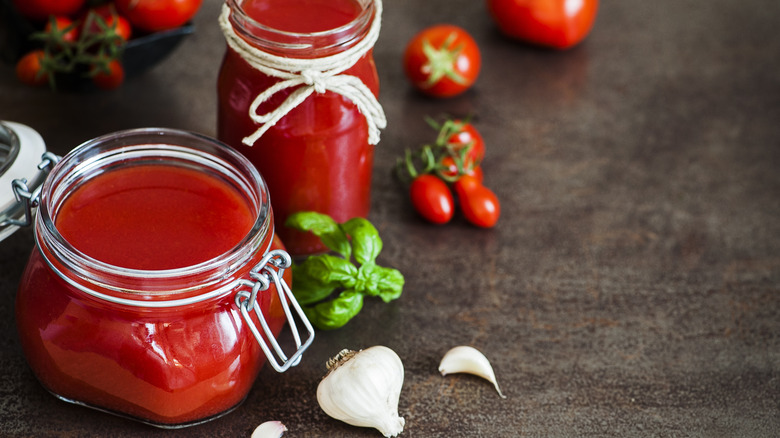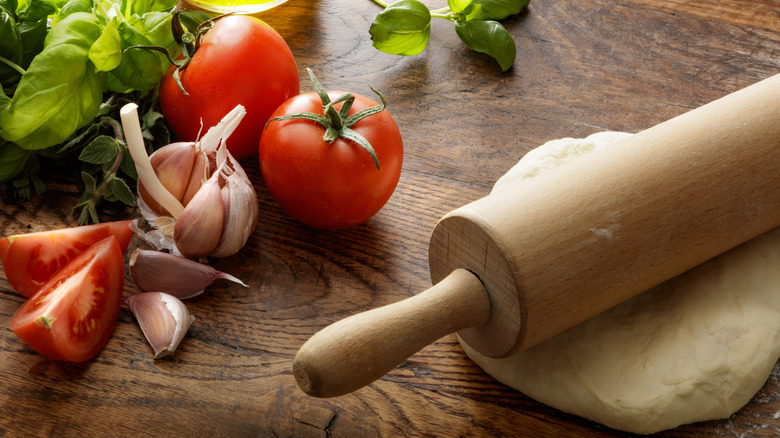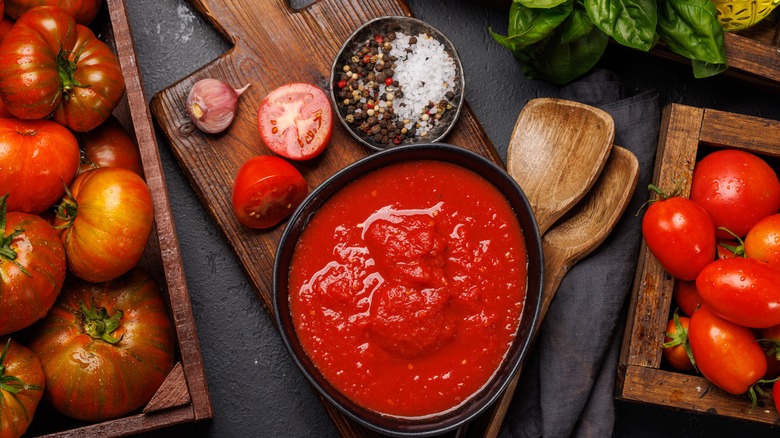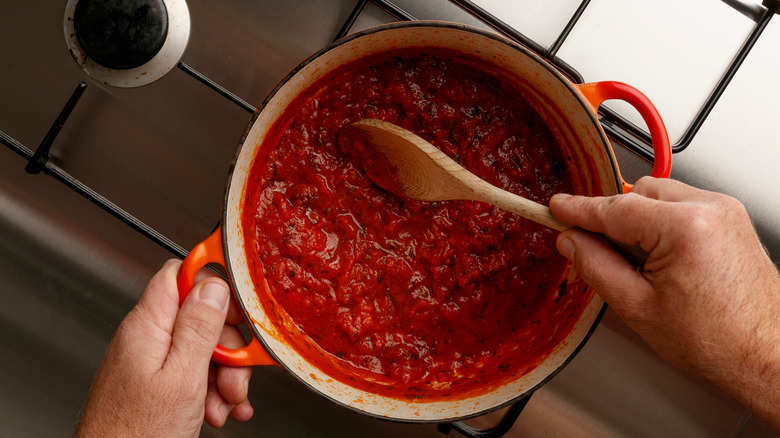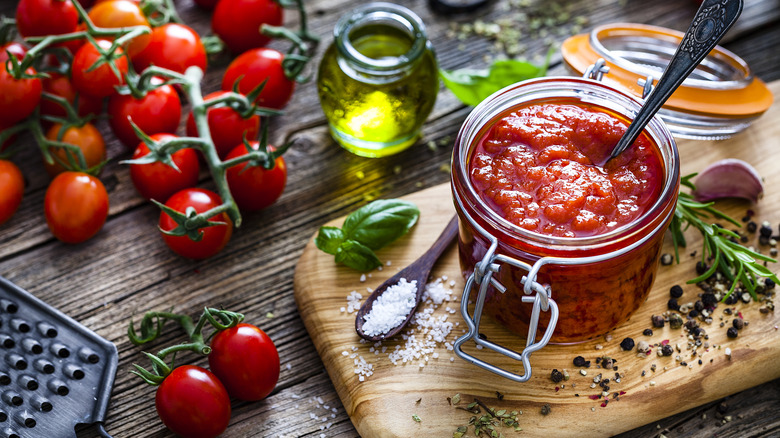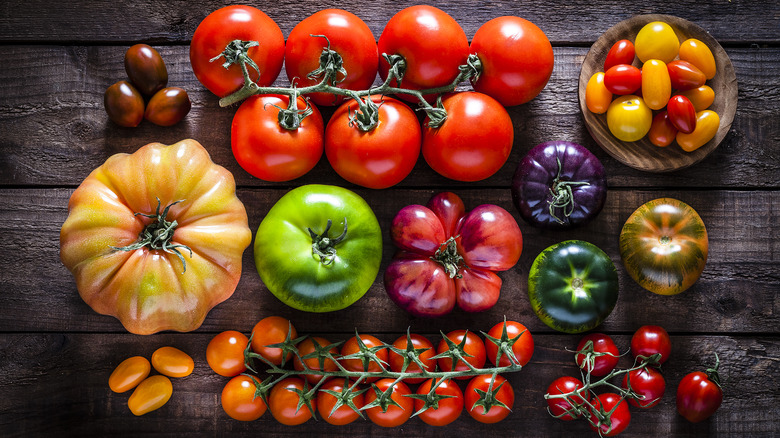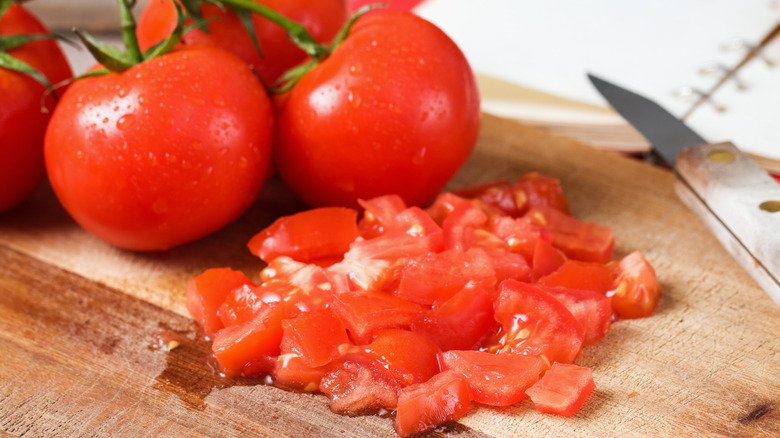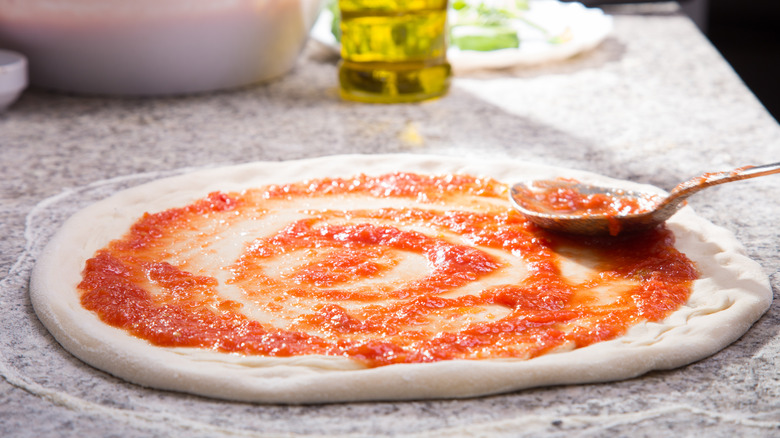Store-Bought Vs Homemade Pizza Sauce: Which Is Better?
Pizza is popular for a reason — it's unarguably one of the best foods around. Bread piled high with melty cheese and other toppings. What's not to love? When you make it at home, there's even more chance to get it just how you like it, but what about that vital but often-overlooked component — the sauce? The age-old debate continues: store-bought or homemade pizza sauce? Which one is best?
Each has its own merits and drawbacks. Store-bought pizza sauce, undoubtedly, is more convenient. With a simple trip to the grocery store, you can have a jar of pizza sauce ready to go, sparing you the time and effort of preparing it from scratch. The market is brimming with diverse options, from classic tomato-based sauces to unique, gourmet blends that cater to a variety of tastes. But does this convenience come at the cost of flavor and quality?
On the other side of the spectrum, homemade pizza sauce offers the allure of complete customization. You have full control over the ingredients, letting you adjust the flavors to your liking and experiment with fresh herbs and spices. However, making pizza sauce from scratch demands time, dedication, and a degree of culinary expertise.
As we delve deeper into the great pizza sauce debate, we'll examine factors such as taste, aroma, texture, cost-effectiveness, and ingredients. By the end of this article, you'll be armed with the knowledge to make an informed decision and declare your allegiance to either store-bought or homemade pizza sauce.
Pizza sauce vs. pasta sauce
What's the deal with pizza sauce and pasta sauce? Aren't they just the same thing? The primary ingredient in both classic pizza and pasta sauce is tomatoes, but the type of tomatoes and their preparation differ. Pizza sauce often uses canned tomato products, like tomato puree or crushed tomatoes, which provide a smooth, thick consistency. Pasta sauce, on the other hand, frequently incorporates whole or diced tomatoes, lending a chunkier texture to the sauce.
Pizza sauce is made for spreadability and adherence to the pizza dough. It's thicker and less watery than pasta sauce to prevent the pizza crust from becoming soggy during baking. In contrast, pasta sauce is usually thinner to coat the noodles evenly, allowing the flavors to meld together while cooking. Pizza sauce also usually has simpler ingredients to let the pizza base and toppings shine, while pasta sauce often has bolder additions.
But, perhaps the main difference is the cooking method. Pizza sauce is usually put on the base raw or minimally cooked. Its primary cooking occurs when baked on the pizza in a hot oven, allowing the flavors to meld and intensify as the pizza cooks. On the contrary, pasta sauce requires simmering on the stovetop for an extended period to marry the ingredients and create a well-balanced sauce. So, before you pick up a jar of pasta sauce and throw it on your pizza, remember that pizza and pasta sauce aren't the same thing.
Ingredients
Now, let's look at the ingredients in store-bought pizza sauces and how they differ from what's in homemade sauce. In quality pizza sauce, whole or diced tomatoes are the first ingredient, but in some cheaper store-bought offerings, tomato paste or tomato puree is the first ingredient. This leaves you with a sauce that tastes muddier and less fresh than homemade sauce, made using canned or raw tomatoes. That said, there are some simple pizza sauce recipes that use tomato sauce and tomato paste as a base.
Garlic is a must-have ingredient in pizza sauce. While homemade sauces should use fresh garlic for the best flavor, store-bought sauces sometimes use fresh garlic and sometimes garlic powder. Store-bought sauces almost always have some form of onion in them — whether fresh (better) or powdered (worse) — while onion may or may not be found in homemade recipes.
As for herbs, oregano and basil are the most commonly found options in store-bought sauces. They're also the classic choices for homemade sauce, but in homemade sauce, you can use fresh herbs to elevate the flavor. Homemade sauce is then rounded out with salt and extra-virgin olive oil. While you'll also find salt and oil in ready-made sauce, it's not always extra-virgin olive oil.
Some store-bought sauces have extra ingredients you won't find in homemade, such as preservatives or colorings. Others have some unusual sweeteners, like pineapple juice or molasses, which aren't traditional.
Shelf-life
Store-bought pizza sauce is typically processed and sealed in airtight containers. This commercial packaging, preservatives, and pasteurization extend its shelf life considerably. Unopened, store-bought pizza sauce can last for a significant amount of time, often up to a year or more, depending on the brand and specific preservation methods. Once opened, however, the clock starts ticking. Store-bought pizza sauce generally maintains its quality and safety for a shorter period, typically around five to seven days when refrigerated. Ultimately, you should check the packaging to find the exact length of time it's safe to keep in the fridge, as specified by the manufacturer.
Homemade pizza sauce, prepared with fresh ingredients, lacks the preservatives and pasteurization methods used in commercial products. Consequently, its shelf life is notably shorter. When stored in an airtight container in the refrigerator, homemade pizza sauce typically remains safe to eat for about three to five days. Beyond this point, it's advisable to exercise caution as the risk of spoilage and bacterial growth increases. To extend the shelf life of homemade pizza sauce, freezing is an option. When properly frozen in a suitable container or ice cube trays, it can maintain its quality for up to three to six months.
Convenience
Store-bought pizza sauce is incredibly convenient due to its immediate availability. A quick trip to the grocery store can supply you with a variety of pizza sauce options. This is especially advantageous when you're short on time or want to whip up a pizza in a hurry. One of the biggest advantages of store-bought pizza sauce is the absence of preparation. There's no need to gather ingredients, chop garlic and onions, or blend the mixture to a smooth paste. You can simply open the jar and spread it on your pizza crust.
Homemade pizza sauce naturally takes more effort because you're making it from scratch. That said, there are plenty of simple, no-cook pizza sauce recipes that just require blending the ingredients. You can be done in five minutes and have something delicious and tailored to your preferences. So, store-bought sauce is obviously more convenient and requires less prep work, but you might be surprised at how easy it is to make homemade sauce for pizzas.
Customization
Customization options are a pivotal aspect of the pizza sauce experience, and they differ significantly between homemade and store-bought varieties. When you make pizza sauce from scratch, you have complete control over every ingredient that goes into it. You can experiment with various herbs, spices, and seasonings to create a sauce that perfectly suits your taste buds.
Whether you prefer a robust, spicy sauce or a milder, herb-infused one, the possibilities are endless. You can even add unexpected ingredients, such as parmesan cheese. Fresh garlic, onions, basil, and other herbs in your homemade sauce can enhance its flavor and aroma. You can also adapt the sauce to suit dietary restrictions or flavor preferences, such as making it vegan or gluten-free.
Store-bought pizza sauce, on the other hand, comes with a pre-set ingredient list. While there's a wide variety available, you have limited control over the specific ingredients used and their quality. Sure, you can add extras, but it's not the same as creating your sauce entirely from scratch. That said, pizza sauces you buy at the store offer consistency in flavor, which can be a plus if you enjoy the same taste every time.
Cooked versus uncooked
If you were asked to guess, you'd probably think all pizza sauce is cooked, but this generally isn't the case. Most pizza sauce is left uncooked before it is applied to the pizza because it undergoes a cooking process while the pizza itself bakes in a hot oven. By using uncooked sauce, the tomatoes, and other fresh ingredients maintain their vibrant and fresh flavor. Cooking these ingredients separately beforehand can lead to a loss of that freshness.
It isn't all cut and dried; there's also an argument for cooking pizza sauce before it goes on the base. This helps develop the flavors the way simmering a tomato sauce for pasta does. The finished sauce has a richer, deeper taste, with caramelization occurring, adding to the sweetness.
The majority of store-bought pizza sauces are uncooked, as are most recipes for homemade sauce. However, if you make your pizza sauce at home, you can experiment with cooked recipes to see which you prefer. It can also be hard to tell on the packaging of store-bought sauce whether it's uncooked, minimally cooked, or has been simmered for hours. This lack of transparency means you're less sure what you're getting and what the sauce will taste like on the pizza — fresh, zingy, or deeply rich.
Cost
Comparing the relative cost of homemade pizza sauce and store-bought pizza sauce involves considering various factors, including the cost of ingredients, preparation time, and portion size. Let's delve into these aspects to determine which option may be more cost-effective for your pizza-making endeavors.
Homemade pizza sauce typically involves purchasing fresh tomatoes, herbs, spices, garlic, and other ingredients. While the cost can vary based on the quality of ingredients and their availability, it's generally possible to control expenses by selecting affordable options. If you use the most affordable ingredients, homemade pizza sauce costs about half the price to make as even the cheapest store-bought pizza sauce.
The initial cost of purchasing ingredients for homemade sauce may be higher than buying a single jar of store-bought sauce, especially if you need to buy pantry basics, like salt and dried herbs. However, the cost per pizza will be lower when you factor in the number of pizzas you can make with one batch of homemade sauce.
Of course, costs vary widely depending on the ingredients you use or the store-bought brands you choose, so comparing the relative prices exactly can get tricky. High-end pizza sauce costs significantly more than the most basic brands. Homemade pizza sauce made with fresh tomatoes from the farmer's market will cost much more than sauce made with budget canned tomatoes.
Tomato varieties
When you buy sauce from the store, whatever tomatoes they used to make the sauce is what you get. Except on rare occasions when you find artisan pizza sauce for sale, you usually won't even know the variety of tomatoes in a store-bought sauce. However, when you make your own sauce, you can use any variety of tomatoes you like. And, the fact is, some tomatoes make a much better sauce than others.
San Marzano tomatoes are often considered the gold standard for making tomato sauce. They're known for their sweet, rich flavor, low acidity, and thick flesh. They originate from Italy and are prized for their culinary qualities. Canned San Marzano tomatoes, whether whole or crushed, are readily available and popular among chefs and home cooks alike. Roma tomatoes are also great for sauce-making. They have fewer seeds and thicker flesh than average tomatoes, making them ideal for sauce, resulting in a thicker and less watery consistency.
Amish paste tomatoes are similar to Roma tomatoes in terms of their shape and suitability for sauce-making. Amish Paste tomatoes have a rich, sweet flavor, making them a great choice for flavorful sauces. While not as commonly used for sauce, cherry and grape tomatoes can make a delightful sauce with a burst of sweetness. They are especially great for quick, fresh pizza sauces.
Taste
When it comes to flavor, it might seem obvious that homemade sauce tastes better, but it's not always as simple as that. Everyone has their own opinions and preferences, with some finding only minimal difference between quality store-bought sauce and basic homemade sauce.
But, of course, it all comes down to how you make it. Homemade pizza sauce often has a depth of flavor that can be missing in some store-bought varieties. The cooking process and the melding of fresh ingredients can create a complex, nuanced taste. And, you get to choose the ingredients yourself, so if you make a pizza sauce using fresh tomatoes, fresh herbs, and high-quality extra-virgin olive oil, it will probably knock any pre-made sauce out of the park. By comparison, if you mix tomato paste, basic jarred tomato sauce, dried herbs, and garlic powder together to make a homemade sauce, you might be able to find a better store-bought variation.
By contrast, store-bought pizza sauce offers a consistent flavor you can rely on from jar to jar. Once you find a brand you like, you can assume it'll taste the same time after time. There are some subpar store-bought sauces but some flavorful ones, too.
Aroma
What can you expect from the aroma of homemade pizza sauce, and how does it compare to jarred or canned sauce from the store? Well, a sauce made from scratch often boasts a fresh, vibrant aroma from using high-quality, aromatic ingredients. The scent of ripe tomatoes, garlic, basil, and other herbs hits you, enhancing your enjoyment of the sauce. That said, it all depends on how you make the sauce because something made with low-quality ingredients won't smell as nice.
Naturally, making sauce from scratch allows you to control the selection and quantity of herbs and spices. This customization enables you to create a sauce with aromatic complexities that match your preferences, whether you like the punchy scent of garlic or the herbal notes of fresh basil. You can even make herb-heavy pizza sauce for added aroma.
The aroma of store-bought sauce varies from brand to brand. Of course, you'll get the pleasant aroma of tomatoes, herbs, and garlic, but it's unlikely to smell as fresh or vibrant as a homemade sauce.
Thickness
The thickness of pizza sauce is important. If it's too watery, it can make your dough turn soggy, but if it's too thick, you might not be able to spread it out thinly enough, resulting in an overwhelming amount of sauce on your pizza. Store-bought pizza sauce should have a reliable thickness, but homemade sauce offers greater control over achieving your desired consistency.
Homemade pizza sauce allows you to tailor the thickness to your liking. You have total control, so you can make it thicker if that's how you like your sauce or thin it out for just a light covering of sauce. Store-bought pizza sauce is typically designed to have a consistency that works well for a wide range of pizza styles. This often means it's of moderate thickness to accommodate various tastes and cooking methods. This might work for most pizzas, but you might occasionally wish for a thicker sauce — such as when making rows of sauce on a Detroit pizza — or a thinner sauce when you want to achieve a light topping.
Chunkiness
Pizza sauce is usually smooth, but who are we to yuck your yum when it comes to texture? Sometimes, nothing but a chunky sauce will do. It can be especially nice on more robust pizzas like deep dish varieties. The trouble is, when you browse the aisles at a grocery store, you'll usually find nothing but smooth pizza sauce.
If you want a chunky sauce for your pizza, you will have to go homemade. When you make your sauce from scratch, it provides the opportunity for complete customization of chunkiness. You can choose to finely dice ingredients like tomatoes, onions, and garlic for a smoother sauce or leave them coarser for a chunkier texture. Or, of course, you can blend them for a completely smooth sauce. Using fresh tomatoes usually means a chunkier texture is retained. But diced canned tomatoes offer a chunky texture, too, but with a little more softness, especially once they're cooked on your pie.
Which is better?
The debate between homemade and store-bought pizza sauce is nuanced, and both options have distinct advantages and disadvantages. The choice ultimately depends on your priorities and circumstances.
Homemade pizza sauce gives you control over the ingredients, flavors, consistency, and even the level of chunkiness, allowing you to create a sauce tailored precisely to your taste preferences. You can use fresh, high-quality ingredients to make an exceptionally flavorful sauce that's way better than anything you could buy at the store. But making your own sauce demands time, effort, and some skill in the kitchen.
Store-bought pizza sauce is incredibly convenient. It requires no preparation and is readily available at most grocery stores. It's perfect for busy nights when you want to make a quick, hassle-free pizza. Store-bought sauce offers consistency in flavor and texture. You can rely on a consistent taste every time you purchase a specific brand. However, ready-made pizza sauces have predefined flavors and textures, so you can't customize them exactly how you want them. Plus, the quality of store-bought sauce varies between brands. Some are great, while others are best avoided.
Both homemade and store-bought pizza sauce have their merits. Ultimately, the "better" choice depends on your priorities, available time, and culinary preferences. There isn't a single right option, so why not make your own sauce when you have time and reach for the store-bought stuff when you don't?

